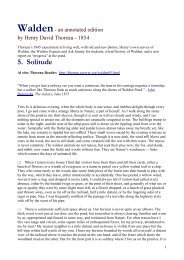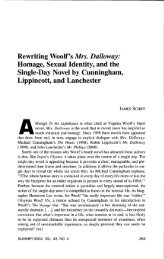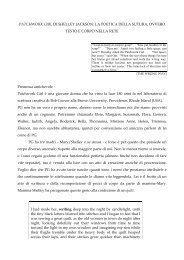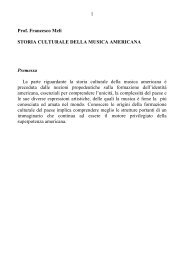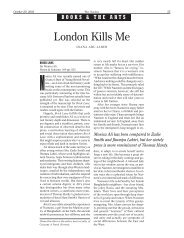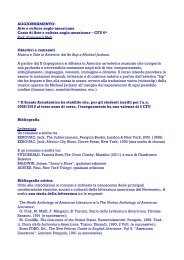Exciting Tales of Exotic Dark India - Paola Carbone
Exciting Tales of Exotic Dark India - Paola Carbone
Exciting Tales of Exotic Dark India - Paola Carbone
Create successful ePaper yourself
Turn your PDF publications into a flip-book with our unique Google optimized e-Paper software.
288 Journal <strong>of</strong> Commonwealth Literature<br />
historical background. Indeed, the writer warps the purpose <strong>of</strong> Wen Jiabao’s<br />
Delhi visit in April 2005, the stated aim <strong>of</strong> which was not to discover<br />
the “truth” about <strong>India</strong>n entrepreneurship, but rather to contribute to<br />
resolving the longstanding border dispute between <strong>India</strong> and China. Adiga<br />
thus destabilizes historical facts in his retelling <strong>of</strong> an event from recent<br />
<strong>India</strong>n history. If Saleem Sinai, the protagonist <strong>of</strong> Midnight’s Children, is<br />
an unreliable narrator in the sense that he subverts the <strong>of</strong>ficial version<br />
<strong>of</strong> modern <strong>India</strong>n history, Adiga’s Balram is an unreliable, because<br />
“unreal”, <strong>India</strong>n subaltern subject. While the critical rhetoric <strong>of</strong> “Real<br />
<strong>India</strong>” seems to imply a discarding <strong>of</strong> impurity and hybridity, The White<br />
Tiger strategically stages its inauthentic <strong>Dark</strong> <strong>India</strong>.<br />
Attesting to the pervasiveness <strong>of</strong> the “anxiety <strong>of</strong> <strong>India</strong>nness”, Adiga<br />
himself seems to have – maybe unwittingly – succumbed to such angst.<br />
In an interview published on the Man Booker Prize website shortly after<br />
The White Tiger was included on the 2008 longlist, Adiga’s claiming,<br />
or rather reclaiming, <strong>of</strong> a “real” <strong>India</strong>nness echoes Chandra’s parodic<br />
description quoted earlier:<br />
It’s a great thrill to be longlisted for the Booker. Especially alongside<br />
Amitav Ghosh and Salman Rushdie. But I live in Mumbai, where not many<br />
people know <strong>of</strong> the Man Booker Prize; I’m still standing in long queues<br />
and standing in over-packed local trains in the morning and worrying<br />
about falling ill from unsafe drinking water. Life goes on as before. 56<br />
The writer’s assertions <strong>of</strong> authenticity are based on his groundedness<br />
in a “Real <strong>India</strong>” where speakers <strong>of</strong> English only amount to a meagre<br />
percentage <strong>of</strong> its inhabitants: Balram clarifies that he does not speak<br />
English from the outset (p.3).<br />
The “realities” <strong>of</strong> Adiga’s <strong>India</strong>, that is, the specific material<br />
circumstances under which The White Tiger was produced, are made<br />
obvious by the adversative conjunction “But” that clearly distances<br />
his artistic predicament from Ghosh and Rushdie’s. These diasporic<br />
writers, besides being part <strong>of</strong> the <strong>India</strong>n English-speaking elites, share<br />
an additional commonality with Adiga in that they have also authored<br />
novels longlisted for the Booker in 2008. Nevertheless, unlike Adiga<br />
who currently lives in Mumbai (after spending many years abroad),<br />
Ghosh and Rushdie are mainly domiciled in New York and are hence<br />
removed, at least physically, from the actuality <strong>of</strong> the country. Adiga<br />
here seems to partake <strong>of</strong> the recurrent criticism according to which<br />
commercial success for <strong>India</strong>n English writers depends on their voluntary<br />
expatriation to countries in the West or, as Chandra put it, to “faraway<br />
air-conditioned regions <strong>of</strong> vilayat”. 57 In opposition to the western-located<br />
NRIs Ghosh and Rushdie, Adiga seems to suggest in this interview his<br />
intimate knowledge <strong>of</strong> <strong>India</strong> provided by an unfiltered, first-hand access<br />
Downloaded from jcl.sagepub.com at Senate House Library, University <strong>of</strong> London on November 29, 2010



